Cubas Baseball Defectors
Cubas Baseball Defectors
The Inside Story
Peter C. Bjarkman
ROWMAN & LITTLEFIELD
Lanham Boulder New York London
Published by Rowman & Littlefield
A wholly owned subsidiary of The Rowman & Littlefield Publishing Group, Inc.
4501 Forbes Boulevard, Suite 200, Lanham, Maryland 20706
www.rowman.com
Unit A, Whitacre Mews, 26-34 Stannary Street, London SE11 4AB
Copyright 2016 by Rowman & Littlefield
All rights reserved. No part of this book may be reproduced in any form or by any electronic or mechanical means, including information storage and retrieval systems, without written permission from the publisher, except by a reviewer who may quote passages in a review.
British Library Cataloguing in Publication Information Available
Library of Congress Cataloging-in-Publication Data
Name: Bjarkman, Peter C.
Title: Cubas baseball defectors : the inside story / Peter C. Bjarkman.
Description: Lanham : Rowman & Littlefield, [2016] | Includes bibliographical references and index.
Identifiers: LCCN 2015037834| ISBN 9781442247987 (hardcover : alk. paper) | ISBN 9781442247994 (ebook)
Subjects: LCSH: BaseballPolitical aspectsCuba. | DefectorsCubaHistory.
Classification: LCC GV863.25.A1 B525 2016 | DDC 796.357097291dc23
LC record available at http://lccn.loc.gov/2015037834
 TM The paper used in this publication meets the minimum requirements of American National Standard for Information Sciences Permanence of Paper for Printed Library Materials, ANSI/NISO Z39.48-1992.
TM The paper used in this publication meets the minimum requirements of American National Standard for Information Sciences Permanence of Paper for Printed Library Materials, ANSI/NISO Z39.48-1992.
Printed in the United States of America
In memory of Yadier Pedroso (19862013),
who represented everything that was both best
and also most tragic about Cuban baseball...
Acknowledgments
You see, you spend a good piece of your life gripping a baseball and in the end it turns out that it was the other way around all the time.Jim Bouton, Ball Four
No journey is quite as simple as the twisting highways and byways it traverses; no tale quite reduces itself to the broad plot lines on which it is built; and no human life is adequately capsulized with a mere chronology of the myriad adventures that comprise its months, years, and decades. Built on nearly two decades pursuing (as a devoted fan, sports historian, and working journalist) Cubas national sport of baseball, both inside the island nation and around the globe, this book offers both a much-needed narrative history and a too-long-absent explanation for the Cuban baseball player defection phenomenon that has so dominated North Americas big-league headlines throughout the past several seasons.
These chapters explore the daring and often tortuous migrations of some of the better-known Cuban stars who have abandoned low-wage celebrity status in their homeland to endure life-altering (and occasionally life-threatening) pilgrimages in search of multimillion-dollar celebrity status on center stage in the North American major leagues. In the process of pursuing this complex and sometimes sordid tale these pages also expose numerous less celebrated and far less inspiring stories of dozens more who have abandoned family, friends, culture, and profession at home in search of elusive big-league dreams never destined to be realized. In brief, the book explores a phenomenon that now perhaps better than any other exposes both the proud successes and the soft underbelly failures not only of Cubas little-understood socialist baseball experiment but also of the all-powerful major league baseball (MLB) enterprise itself.
In the process of telling this story it has been necessary to touch on issues far removed from a shared national sporting pastime that has gripped attention in both countries for more than a century. Of necessity this book also addresses perplexing and even perturbing hot-button issues that have divided two neighboring Western Hemisphere nations across the five-decade-long tenure of eleven American presidents (if only one oversized Cuban caudillo leader) and in the process have also firmly cemented Cuba in our consciousness as an indelible American foreign policy obsession. In brief the story contained here is about far more than the small world of professional baseball. And it is that very complexity in the end that makes this a tale worth the telling.
Readers will encounter in these chapters a pair of overarching and ultimately intertwining thematic and structural threads. The first has to do with the necessity of defining Cuban baseball itselfits rich history, its indelible legacies, and its inextricably Cuban nature, especially in its post-1962 makeover as a bastion of the Cuban Soviet-style socialist sporting system. Just as much as the Japanese and Koreans in the Orient, the Cubans have adapted a self-proclaimed American sport (one transported to their shores in the mid-nineteenth-century) to their own needs and transformed it into a spectacle highly distinct from the North American version today represented almost exclusively by the corporate operation known as major league baseball. Author Robert Whiting once sagely noted that baseball in Japan appears to be the same as the US versionbut it isnt. The same wisdom applies to the Cuban version, in the years both before and after Fidel Castros arrival. Cubas current baseball crisisa self-induced malaise involving far more than the current much-publicized talent drainonly makes sense when set alongside its chaotic if largely glorious past: an evolutionary history stretching from earliest twentieth-century blackball barnstorming winter league seasons, through initial Cuban forays onto the big-league scene in the wake of racial integration and Jackie Robinson, and finally down to bold Castro-era experiments in using the national sport as both an effective instrument for reconstructing socialist society and a potent political weapon for demonstrating symbolic triumphs of the Cuban Revolution itself.
A second equally vital theme underpinning this analysis is one hinted at in Jim Boutons whimsical if prescient notion that we far too often reduce the national sport of baseball to a childish diversion and, in the process, misapprehend its true meanings and deeply ingrained roots defining our cultural identity. Baseball always seems to emerge as something other than what we first assumed. We oftenperhaps in much larger contexts than even Bouton imaginedfail to see that with most of our baseball obsessions it may indeed have always been very much the other way around. I will argue here that our mainstream mediaespecially in the wake of Barack Obamas bold December 2014 efforts at placing a belated wedge in a long-standing United StatesCuba stalematehas rather badly misconstrued and misreported the stories of Cuban ballplayers flocking to the Promised Land of North American big leagues. Popular press accounts have mostly gotten the whole story essentially backwards. Standard procedure has been predictably to frame the entire issue in the guise of yet one more inspired tale about the enticements and glories of an elusive American Dream. The story is thus dressed up as another Horatio Alger rags to riches saga of disadvantaged athletes long exploited by a monstrous Castro regime heroically breaking free from their slave baseball state while risking life, limb, and painful family separation in order to reap just rewards on lucrative major league playing fields. It is a version of reality that meshes perfectly with an all-too-familiar standard line on Cuba (its eroded politics and collapsing socialist society) that has been regular media fodder in Miami, Washington, and much of the rest of our nation for close to two generations. Nonetheless, this story, like Boutons own personal history with the game, may well be best viewed the other way arounda reverse tale contradicting the one so far popularly told. And in the end, the Cuban talent drain may now haunt MLBs survival every bit as much as it haunts Cubas own baseball future. My approach here has been to view the saga from not one but two drastically different perspectives: the more familiar (if often misconstrued) view trumpeted by most US media as well as the somewhat different perspectives both found in the Cuban government-controlled press and also voiced by surprisingly knowledgeable fans on the streets of Havana and in ballparks spread across a long-isolated island nation of 11-million-plus hardcore baseball fanatics. From both angles the story remains complex, controversial, and open to a plethora of contrasting interpretations.
Next page

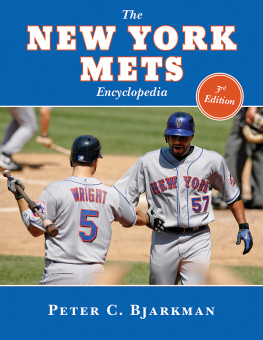

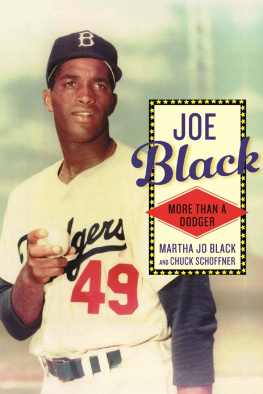
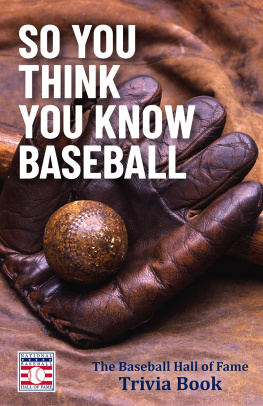
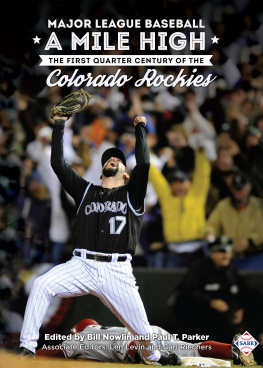

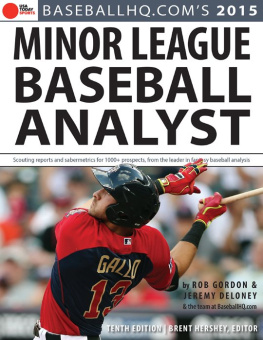
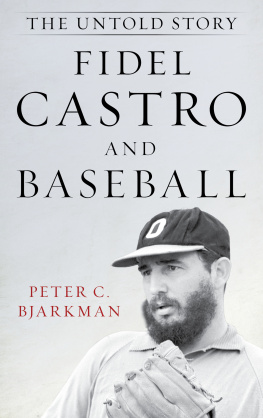
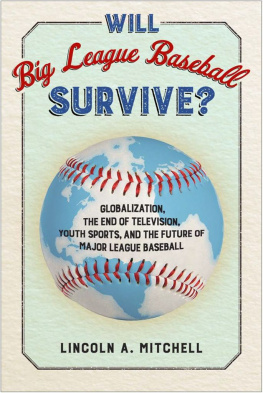
 TM The paper used in this publication meets the minimum requirements of American National Standard for Information Sciences Permanence of Paper for Printed Library Materials, ANSI/NISO Z39.48-1992.
TM The paper used in this publication meets the minimum requirements of American National Standard for Information Sciences Permanence of Paper for Printed Library Materials, ANSI/NISO Z39.48-1992.